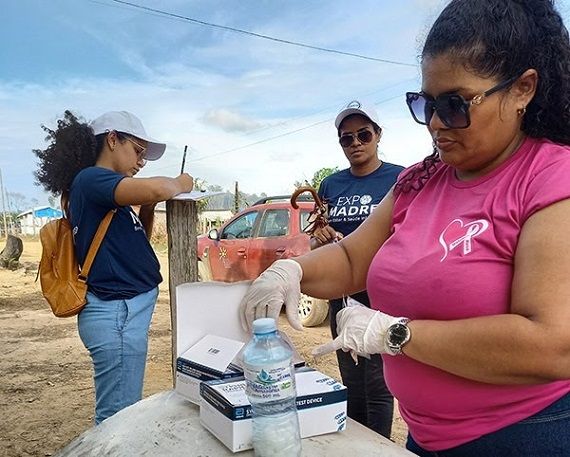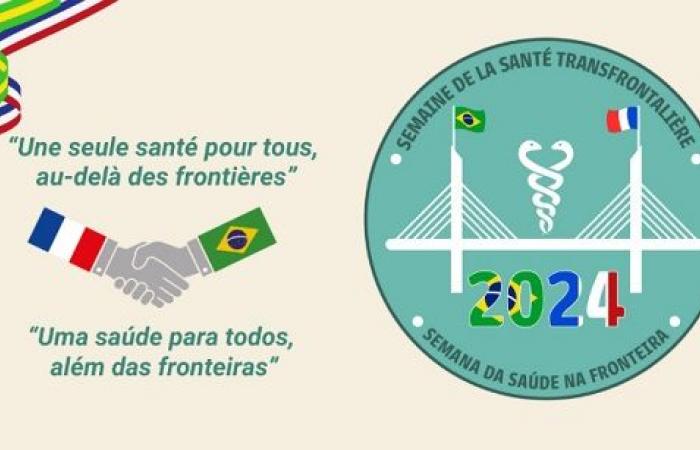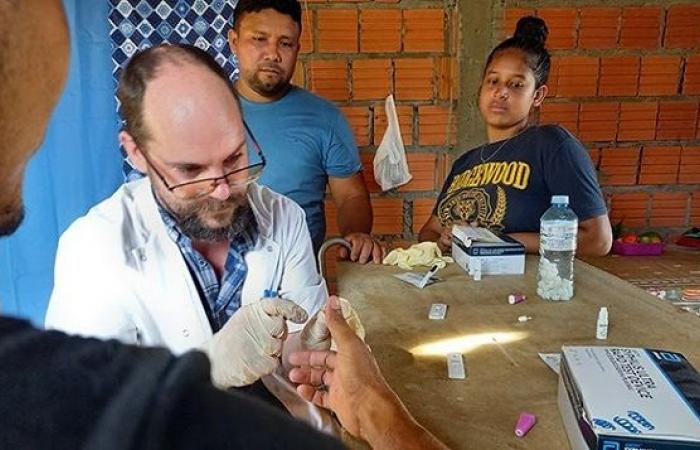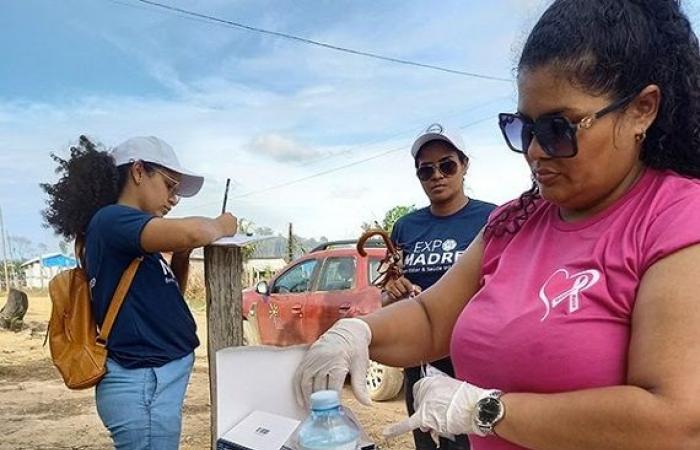01/12/24
A week to strengthen actions between Guyana and Amapa
From Monday to Friday, Cross-Border Health Week takes place in Saint-Georges, Camopi and Oiapoque. This event brings together French and Brazilian health institutions and stakeholders. It represents a crucial opportunity to strengthen cooperation in public health, environmental health and health security between our two territories.
How can we fight malaria as effectively in Amapa as in Guyana? How can patient data be exchanged between healthcare professionals in Saint-Georges and Oiapoque while respecting regulations? How to reduce waste dumping in the Oyapock? How to protect a battered woman on both sides of the border? These are some of the questions that participants in Cross-Border Health Week will be trying to find answers to all next week in Saint-Georges and Oiapoque.
Such an event, organized by the Regional Health Agency, had not taken place since 2018. The municipality of Oiapoque expressed the wish that it be renewed, during the third cross-border joint commission between France and Brazil , which took place in Macapa on June 12 and 13. Shortly before, the meeting between the President of the Republic Emmanuel Macron and the President of the Federative Republic of Brazil Lula had resulted in the adoption of a Franco-Brazilian action plan including axes on global health and the deepening of bilateral cooperation. Several mechanisms already make it possible to collaborate – Oyapock health cooperation, sharing of information between health monitoring services, health cooperation center – or are in the works, such as the Oiapoque women's house. These five days will be an opportunity to work on the main health issues in the border area and to relaunch the dynamic at the regional level, by working on care pathways, data sharing, and actions to be carried out in 2025.
This week will open Monday afternoon with an official ceremony and a bridge march on the bridge over the Oyapock. The week will be punctuated by numerous awareness, prevention and screening actions in Saint-Georges, Oiapoque and Camopi (you can find the complete program in the Agenda de la Lettre pro). Several workshops will bring together stakeholders around the main issues of cross-border health.
Care, monitoring and health safety. Tuesday morning will be devoted to discussions around a “framework for continuing care and effective monitoring”. This will include coordination and protocols for cross-border care, the movement of health professionals, health surveillance and prevention. In terms of monitoring and health security, the Regional Health Agency, the Amapa Health Monitoring Superintendency and Public Health France hold monthly meetings where they can discuss the epidemiological situation and health alerts. The objective is to go further by organizing synchronized prevention and health promotion actions, to find solutions to facilitate the management of health signals, to develop a regional approach in the fight against diseases such as malaria, leishmaniasis, arboviruses and STIs, and to work on the regulatory framework for diagnosis, data exchange and patient pathways.
Infectious diseases. During a workshop organized Tuesday afternoon, Drs Céline Michaud, Jean-Yves Cattin (CHC) and Francky Mubenga (ARS) will address three topics:
- HIV through the screening campaign organized at the end of October in Oiapoque (read below) and the care pathway for people living with HIV;
- Malaria with the experience of the Malakit project and mobile teams deployed around Saint-Georges;
- Tuberculosis with an epidemiological presentation, resistance, the activity of the anti-tuberculosis center and the patient journey in Brazil.
Mental health. In this area, the provision of care is low in the border area. A workshop organized on Tuesday afternoon will clarify what is being done on both sides of the Oyapock, provide information on the support that is offered, work on action sheets and on a framework guaranteeing continuity care.
Fight against violence. When it comes to gender-based violence, the border area is faced with two judicial systems, a very mobile population, a limited supply of care and support, and difficulties in guaranteeing confidentiality and legal protection. Several projects are already underway such as Oyapock health cooperation or on track such as the Oiapoque women's house. These topics will be discussed during a workshop Wednesday afternoon.
Digital health. Sharing information between healthcare professionals on both sides of the border is a major challenge in the healthcare process. They got into the habit of doing this with mainstream instant messaging. This subject was already discussed at the beginning of the month, during the visit of the Digital Health Agency to Saint-Georges. The ANS had indicated that it will study whether a practical, reliable and secure solution can be implemented in this border context. This will be discussed again during a workshop on Wednesday afternoon.
Environmental health. One of the main issues relates to waste management, which can be improved on both sides of the border. During a workshop scheduled for Thursday afternoon, the case of Villa Brasil, a village located opposite Camopi, whose discharge empties into the river during the rainy seasons will be discussed. Participants will exchange their experiences of raising awareness of waste sorting on both sides of the border and discuss actions to be implemented in 2025.
Physical activity and well-being. The associations meeting on Thursday afternoon will discuss ways to meet the needs of the population in terms of physical activity and well-being, to develop the practice and to retain practitioners. One of the objectives is to organize two flagship events during the year 2025.
In Oiapoque, door-to-door screening to find the “unknown HIV reservoir”
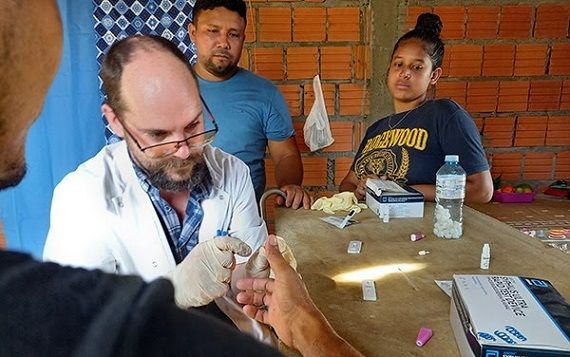
Nova Conquista. New Conquest. In Oiapoque, a border town with Saint-Georges, the newest neighborhood announces the program. You have to head towards the exit of the city, on the BR156, the track which connects Oiapoque to Macapa, 580 kilometers away. Pass in front of the federal university and the bus station. Then cross Infrearo and Areia Branca, two of the poorest neighborhoods in the city. At the top of a hill, the panorama opens onto the burning forest, tracks that sink into it, electric cables that run alongside them and hundreds of concrete block houses. Welcome to Nova Conquista.
“This neighborhood appeared two years ago. Since last year, it has quintupled in size,” estimates Dr Jean-Yves Cattin, doctor at the Saint-Georges local hospital. With Infrearo and Areia Branca, the sector would house “10 to 15,000 inhabitants” with a single doctor, who does not consult every day.
Until 2023, more than 50% discovery at the AIDS stage
It is from these three districts that a large number of patients treated at Saint-Georges come. Many of which for HIV infection, notes Dr. Cattin: “While in general 20 to 30% of positive diagnoses are made at the AIDS stage, in the Oiapoque basin, it was more than half until in 2022. This means either that we are indeed discovering them all late, or that these 50% actually represent 20 to 30% of an even larger number of patients who are not known. Our rate of patients detected at an AIDS stage is so high that this means that there is a reservoir that goes unnoticed. They are the ones we want to discover. » At the end of October and the beginning of November, health professionals from the Saint-Georges local hospital therefore carried out a massive screening operation in these neighborhoods, as well as in three other sectors of the city.
For a week, doctors, nurses and midwives from the local hospital and their colleagues from the Cayenne hospital, municipal nurses from Oiapoque, nursing students from the Mother Teresa school in Oiapoque, mediators and social workers settled in Infrearo, Areia Branca and Nova Conquista. They knocked on every door to offer a rapid diagnostic orientation test (Trod) for HIV and syphilis, but also to raise awareness of breast and cervical cancers. They distributed food baskets, financed by Bolsa Familia, a program to fight hunger reintroduced in 2023 in Brazil. In the event of positive results at Trod, residents were directed to three fixed points, where they were also tested against hepatitis B and C.
In total, 829 people were screened. Among them, 14 Trod syphilis came back positive as well as 6 Trod HIV, four of which were discoveries. Dr Céline Michaud, infectious diseases specialist from the CDPS – local hospitals division, will present the results in detail on Tuesday, during Cross-Border Health Week.
More PLHIV monitored in Oiapoque
Today, residents of Oiapoque living with HIV are cared for in Saint-Georges or Oiapoque. As part of the Oyapock health cooperation (OCS) project, the local hospital monitors pregnant women and HIV-positive children as well as patients at the AIDS stage. People living with stabilized HIV (PLHIV) are followed in Oiapoque, by the Première Ligne system (Primerai Linha), with the same treatments as in Saint-Georges (read the Professional Letter of April 8, 2022).
In 2023, around 70 PLHIV were seen at least once in Saint-Georges; in Oiapoque, the active queue of the municipal health system is 110 PLHIV, part of whom were previously followed on the French side. Other progress is notable: last year, for the first time, the number of cases diagnosed at the AIDS stage fell below 50% in the Oyapock valley. This should also be the case this year.
